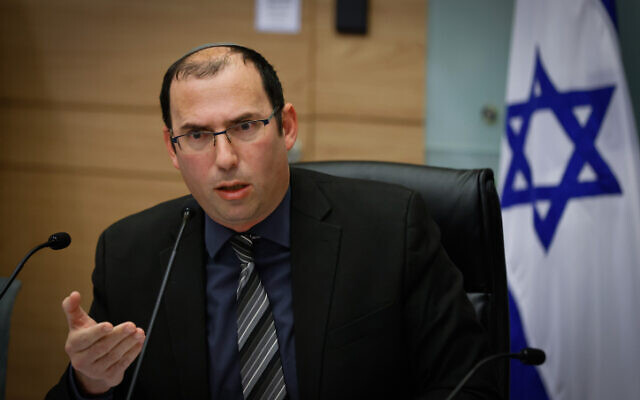A senior coalition lawmaker submitted legislation on Tuesday aimed at restricting the right of union members to launch labor strikes.
The bill comes amid intensive effort by the new hardline government to limit the influence of forces that have the potential to serve as checks on its power, especially the judiciary.
The legislation was submitted by Simcha Rothman, of the far-right Religious Zionism party, who serves as chair of the Knesset’s Constitution Law and Justice Committee and has been a key player leading the government’s efforts to significantly restrict the power of the High Court of Justice.
Rothman’s bill specifically targets the right to strikey of essential workers in the national electricity, water, ports, public transportation and health fields, along with the Israeli Stock Exchange and the Bank of Israel.
The legislation would strip protections from a labor union that strikes in solidarity with a cause that does not directly impact their line of work. This would prevent the national Histadrut labor federation from joining the nationwide protests against the government’s judicial overhaul plan.
Get The Times of Israel's Daily Edition by email and never miss our top stories
Regarding such “sympathy strikes,” the bill stipulates that the action would remain protected if a secret ballot was held by at least half of the workplace and a majority voted in favor.

Chairman of the Knesset Constitution, Law and Justice Committee MK Simcha Rothman leads a hearing, January 29, 2023. (Olivier Fitoussi/Flash90)
The Histadrut has thus far refrained from joining the protests against the government’s legal overhal, with analysts speculating that the country’s largest union doesn’t want to pick a fight with the coalition before it finalizes a new wage agreement for public sector workers. It’s also unclear whether Histadrut members are opposed to the overhaul, given that many of them voted for coalition parties in the previous election.
However, given the significant clout that the Histadrut holds, its leaders could threaten to join the protests in order to improve their hand in the negotiations with the government.
Rothman’s bill also obliges the Histadrut and other labor unions to hold mediation through the Labor Ministry or the government’s National Economic Council before launching a strike.
Under the legislation, the Knesset would be granted the ability to suspend a strike after 30 days in vaguely defined extenuating circumstances, including harm to the national economy or significant disruption to public livelihood.
Such legislation has been submitted by conservative lawmakers in the past but failed to advance due to large opposition in the Knesset. Such resistance to weakening the power of the labor unions still exists, including in the Shas and Likud coalition parties whose members have extensive ties in the Histadrut.

Illustrative: Arnon Bar-David, then a candidate in the elections for the Histadrut, arrives to vote at a polling station, during the Histadrut elections in Tel Aviv, May 24, 2022. (Avshalom Sasoni/Flash90)
Histadrut chairman Arnon Bar-David issued a statement asserting that the bill would not pass.
“Exercising the right to strike is one of the main tools to protect economically vulnerable populations, and I will not allow any party to harm union workers. I knew how to stand up to this threat in the past, and I don’t propose that anyone try us again,” he warned.
The bill was blasted by Rothman’s immediate predecessor in the Constitution Law and Justice Committee, Labor MK Gilad Kariv, who claimed it is “only phase one of a long-term plan” to place the conservative Kohelet Forum think tank in control of the country, “where every man is for himself.”


